The Freedom of Information (FoI) website that is maintained by the Irish government, states that the FoI Act provides for “the right to access official records held by Government Departments or other public bodies”. Since citizens pay for the functioning of the government, they are entitled to know how public services are managed and delivered on their behalf. However, as an example of how the intended effect of this legislation is routinely frustrated, one simple FoI request that I submitted took more than 4 years and cost more than €400 in review fees. This time-consuming and expensive process has recently concluded, with the outcome being that the relevant public body will not even conduct the search that I had requested for official records.
The reason for such outcomes is very often that public bodies in Ireland simply do not provide truthful responses to FoI requests. Moreover, the Office of the Information Commissioner (OIC) that “carries out independent reviews of decisions taken by public bodies”, very often doesn’t seem to care that FoI responses are not truthful. While this remains the case, the financial and other costs that result from untruthful FoI responses, will continue to fall exclusively on FoI applicants, such that public bodies will have little incentive to reveal embarrassing truths that they would rather keep hidden.
The timeline for my more than 4-year FoI request is described below (January 2018 – July 2022) along with the various untruthful responses that I received throughout this period.
January 2016
Successive Irish governments have argued that state Religious Education (RE) courses are objective, such that they do not include faith development with respect to any particular denomination. For example as Minister for Education, Batt O’Keeffe told the Dáil that:
“The NCCA syllabuses are concerned with understanding religion as a phenomenon in the world and are designed to be studied by students of all religious faiths and of none.”
Batt O’Keeffe, Minister for Education
Notwithstanding what syllabuses are produced by the National Council for Curriculum and Assessment (NCCA), this claim is undermined if teachers are being trained to deliver RE according to the tenets of one specific faith. Some of that training is done by means of Continuous Professional Development (CPD), whereby the state funds temporary cover so that working teachers can attend off-site training courses during ‘in-service days’. The Professional Development Service for Teachers (PDST) is a function of the Department of Education (DoE) that delivers such in-service training, including to RE teachers.
On January 13th 2016, the National Director of the PDST responded to a request from Mr Tomás Kenny, the Post Primary Diocesan Advisor from the Roman Catholic Diocese of Kerry. Mr Kenny describes his role as ensuring “that the living mystery of God is communicated to our young people”. This request did not relate to ‘his young people’ though. He was proposing a joint in-service day that would be delivered by both the PDST and the Roman Catholic Church, to teachers that included those from fully state-managed schools without any Church involvement. However, the National Director of the PDST did not respond by explaining to Mr Kenny that the Irish state will only be involved with objective courses about the phenomenon of religion, which are written for those of all faiths and none.
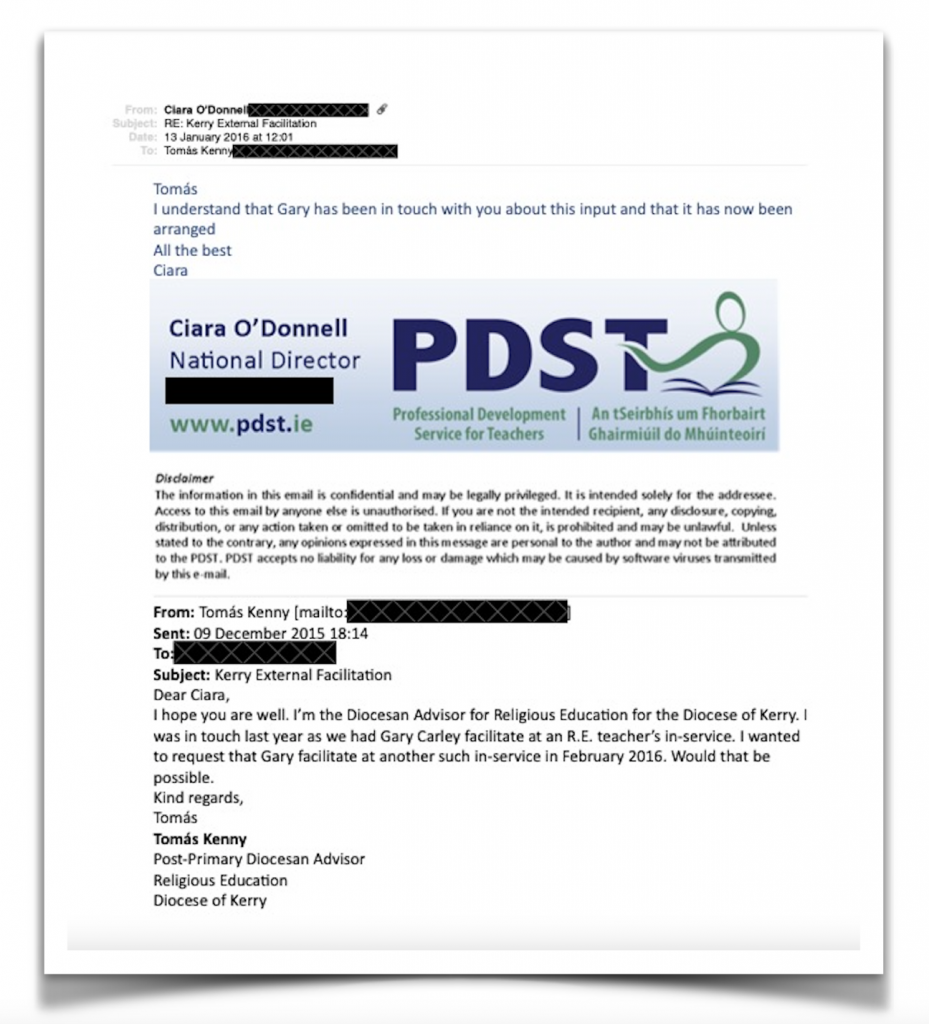
Instead, the National Director of the PDST provided public funding to cover travel and accommodation for two representatives to help deliver this event at the John Paul II Pastoral Center in Killarney. Among the schools that sent teachers to the event was Castleisland Community College. This is a school within the Education and Training Board sector, which is presented to Irish parents as the state alternative to denominational schools. So non-religious parents can select schools with a non-religious patron for their children; they can then be assured by the Minister for Education that the RE course from the NCCA is merely about the phenomenon of religion, and suitable for those of all faiths and none; yet the RE teachers are being trained how to deliver that content to their children by the Roman Catholic Church; all while this teacher training is being financially supported from their taxes.
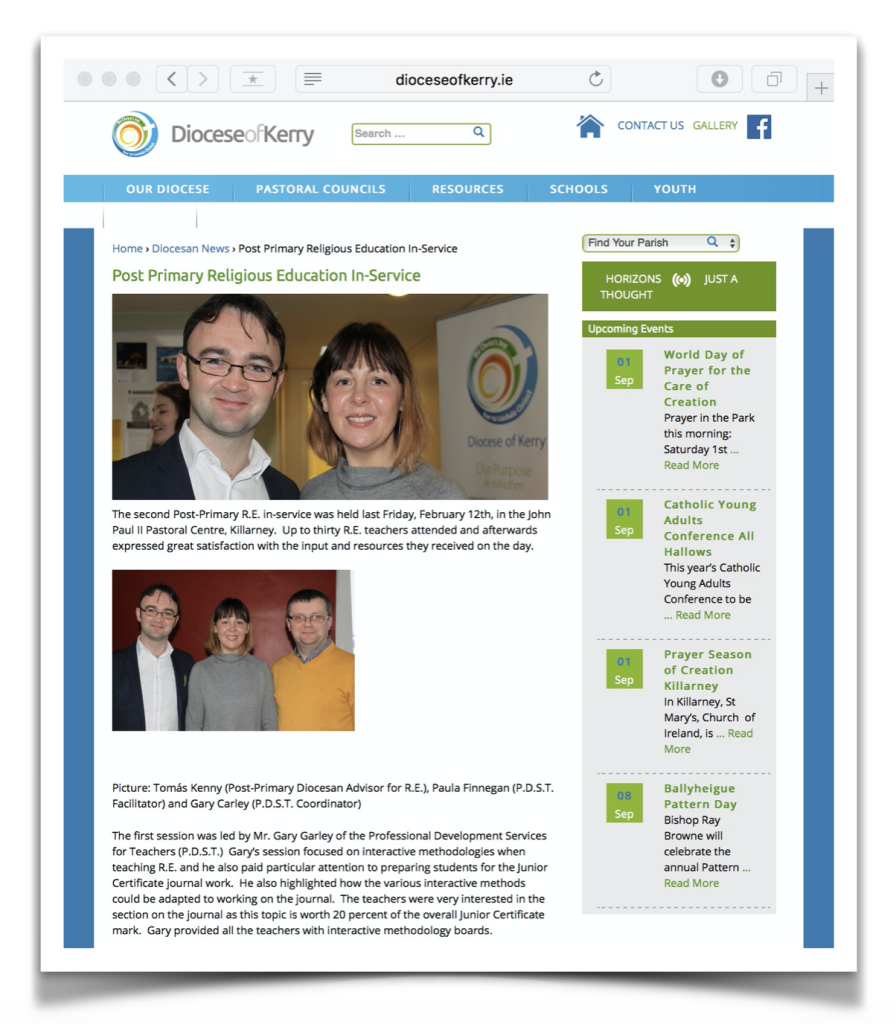
The Annual Reports written by the PDST for both the 2015-2016 and the 2016-2017 school years, are available at the bottom of this page. Such annual reports are not published online, but rather they are delivered internally by the PDST to the DoE. These documents show that in 2016 there were 6 joint RE in-service days, which were jointly arranged by both the PDST and the Roman Catholic Church, and those events were carefully tracked by the PDST. For example, the PDST Annual Report extract below describes 31 teachers attending a PDST in-service day that they delivered in collaboration with the Roman Catholic Church in Dublin. The agenda included content that was related to the Junior Certificate RE course.
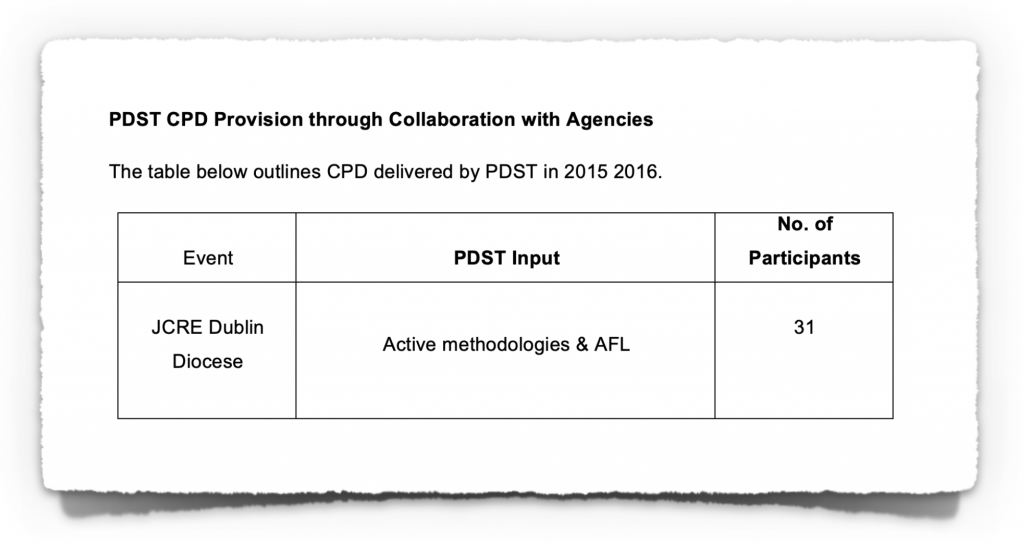
It is entirely inappropriate that state resources are being used to support teacher training around the country, which is delivered in collaboration with the Roman Catholic Church. Discovering all of the details in relation to this kind of publicly funded arrangement, is a good example of what the FoI Act is for.
January 2018
In accordance with Section 12 of the FoI Act, I submitted a formal FoI request to the PDST on 1st January 2018. I sought access to records about the joint RE in-service days that the PDST had delivered with the Roman Catholic Church during 2016. A full copy of this FoI request is available at the bottom of this page, along with a full copy of the PDST response from 30th January 2018. The extract from that response illustrated below, includes the pertinent answers.
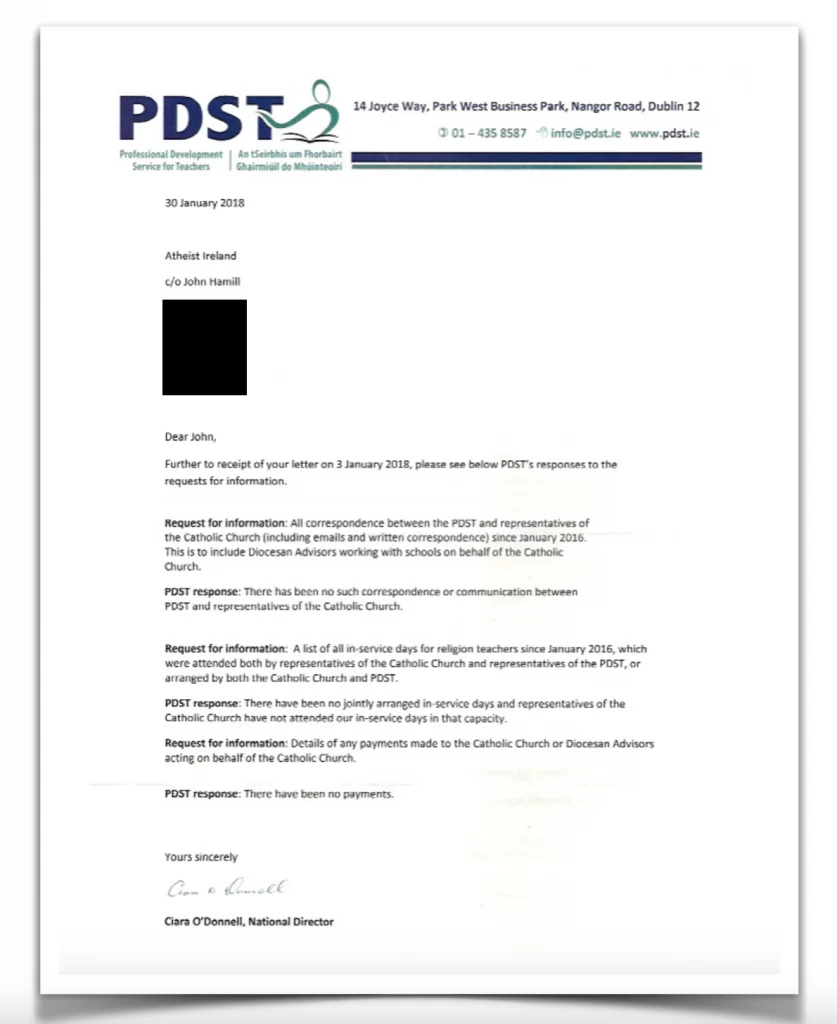
The same National Director of the PDST who had personally engaged directly with the Roman Catholic Church to arrange joint in-service days; and who had written annual reports that listed many such joint in-service days; and who had provided state resources to send multiple representatives around the country to deliver those joint in-service days; denied that any such joint in-service days had ever taken place. In fact, the same National Director of the PDST denied that there had ever been any PDST correspondence at all with any Diocesan Advisors working for the Roman Catholic Church.
This was to be the first of many untruthful statements made by public bodies, which served to frustrate my attempts to access the relevant records.
February 2018
In accordance with Section 21 of the FoI Act, I made a formal request on 2nd February 2018 that the handling of this FoI process should be reviewed by a more senior manager of the PDST. In the context of that review I received an email from the National Director of the PDST, which stated as follows:
“From time to time we are asked by … Diocese bodies to present at their events according to our curricular remit.”
National Director, PDST
A full copy of that email exchange is available at the bottom of this page. It is impossible to reconcile this statement with the formal response to my FoI request, from less than a week earlier. I had sought “all correspondence between the PDST and representatives of the Catholic Church (including emails and written correspondence) … to include Diocesan Advisors”. In response to this request, the same National Director of the PDST wrote:
“There has been no such correspondence or communication between PDST and representatives of the Catholic Church.”
National Director, PDST
Notwithstanding this formal response from the PDST to my initial FoI request, the outcome of the review was to state that the PDST is not subject to the FoI Act. There was no explanation as to why a formal FoI response had initially been provided with untruthful answers. In accordance with Section 22 of the FoI Act, on 21st February 2018 I then sought a review of this outcome by the OIC. Full copies of both the correspondence that I received from the PDST, and also my submissions to the OIC review, are available at the bottom of this page.
August 2018
I received a decision following the OIC review on 21st August 2018. That document is available at the bottom of this page. The OIC decision was to affirm the PDST position. Specifically, the PDST stated that they are “a service provider under the aegis of the Teacher Education Section (TES) in the Department of Education”, and the OIC agreed that the PDST is not a public body for the purposes of the FoI Act. As such, I subsequently sent the same FoI request to the DoE and that request is available at the bottom of this page.
As described with respect to my initial FoI request towards the PDST, in the case that an applicant is not satisfied with the response of a public body, there are two stages of review outlined in the FoI Act. Firstly, applicants can seek an internal review of their FoI request by a more senior manager within the public body concerned. This internal review typically costs €30. If this process has been completed and the applicant is still unsatisfied, then it is possible to seek a review of the FoI application by the OIC. This costs €50 and typically takes more than 6 months. As described below, after I submitted an identical FoI request to the DoE, a further series of answers that lacked candour caused years of delay and hundreds of euro in review fees. Even where it is accepted that such delays have been caused by untruthful statements from public bodies, there is no refund of fees and typically no other consequences either.
January 2019
I received a response to my FoI request from the DoE on 16th January 2019. A full copy of that document is available at the bottom this page, and an extract from the document is illustrated below. As described in this extract, one part of my FoI request sought “a list of in-service days for religion teachers during the calendar year 2016, which were attended by both representatives of the Catholic Church and representatives of the PDST …”. We now know that at the time, the DoE was in possession of electronically searchable annual reports from the PDST, each of which listed all such joint in-service days delivered together by both the PDST and the Roman Catholic Church. However, these annual reports are not public documents and I did not know of their existence at the time.
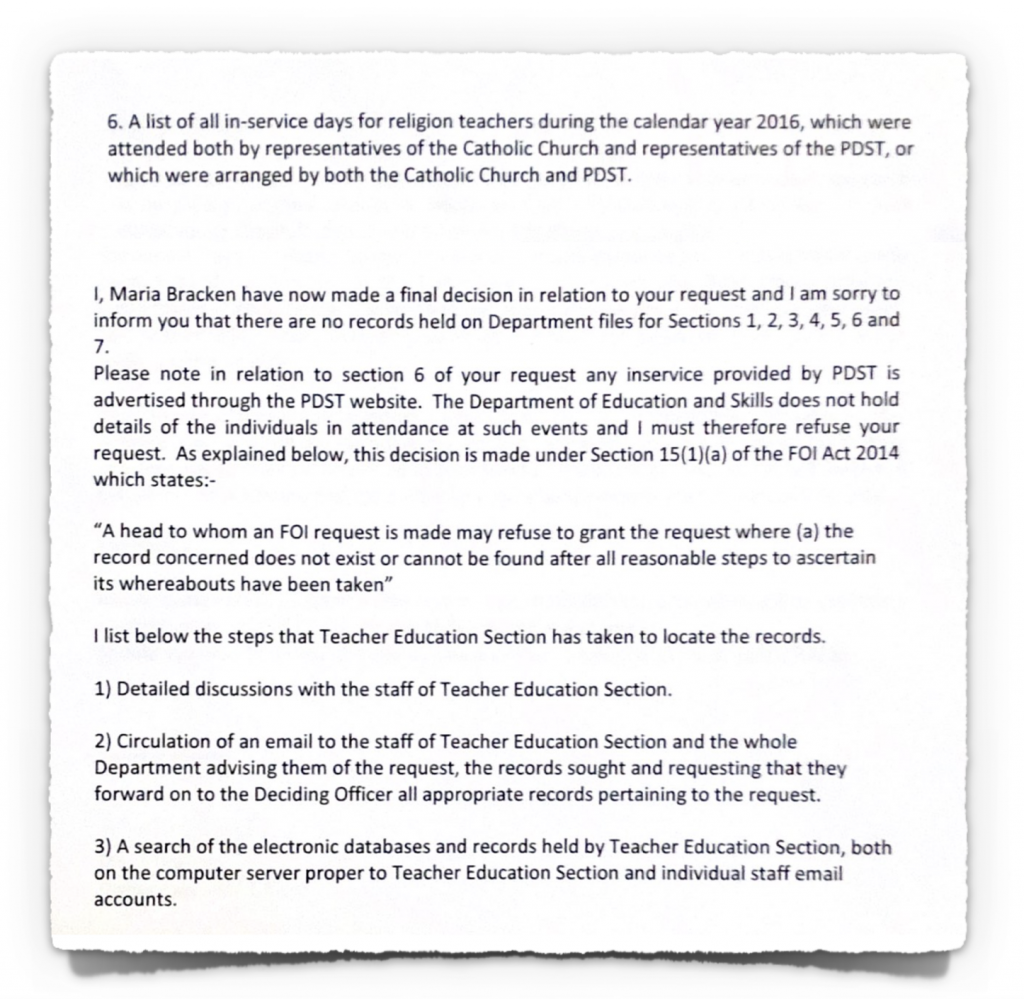
The response of the DoE to that particular part of my FoI request, was to deny that any such documents existed within the Department. This was not a truthful response. It is still difficult to understand how the electronic searches described by the Department could have failed to find the records that my FoI request sought. Nevertheless, the DoE wrote in their formal FoI response that with respect to those documents, “there are no records held on Department files”. This was simply not true.
Moreover, the DoE also refused to ask the PDST to search their records for communications with representatives of the Roman Catholic Church. This was despite the fact that the PDST had already admitted that, “From time to time we are asked by … Diocese bodies to present at their events.”. The DoE insisted that they would only search their own files, as they claimed they were not responsible for records within the PDST. Instead, the DoE argued that that the PDST was a function of the Dublin West Education Center (DWEC) such that my FoI request should be directed there.
I sought an internal review of this decision by more senior representatives within the DoE. The outcome of that review from 31st January 2019 is available at the bottom of this page. Since the internal DoE review affirmed their original decision, I subsequently sought a review of this FoI request by the OIC. My submission to the OIC review process, from 7th February 2019, is also available at the bottom of this page.
August 2019
The decision made by the OIC following this review is dated 21st August 2019, and some extracts from the decision are illustrated below. A full copy of the document is also available at the bottom of this page. The first extract describes why the OIC was satisfied that the DoE had conducted thorough searches for any documents listing joint in-service days, which had been delivered through collaboration between the PDST and the Roman Catholic Church. Notwithstanding these OIC comments affirming the DoE position that they held no relevant records, the truth was that electronically searchable records containing exactly the lists I had asked for did indeed exist within the DoE filing systems at that time.
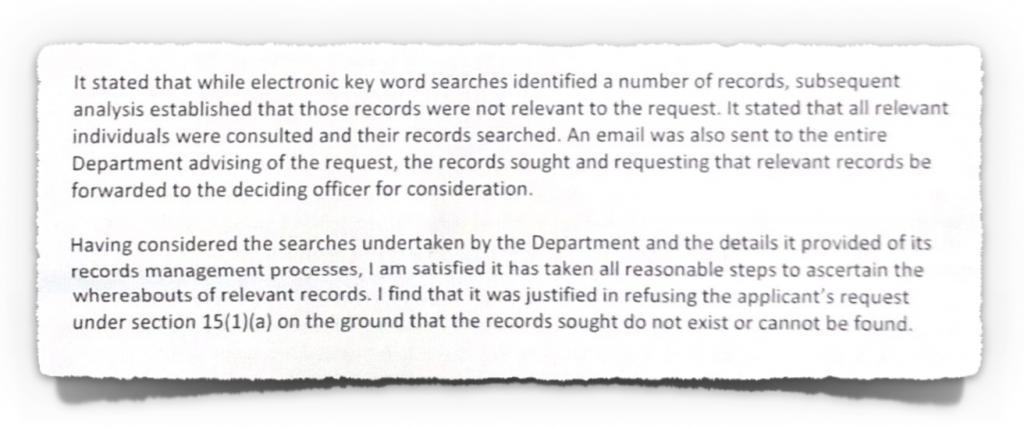
The second extract below describes the decision of the OIC to affirm the position of the DoE, in relation to the DWEC being responsible for FoI requests relating to PDST documents. That is, whereas I had requested communications between the PDST and the Roman Catholic Church; and whereas the National Director of the PDST had already confirmed that those records existed; the OIC agreed with the DoE that the FoI Act did not require the Department to ask the PDST to provide those records. In time, the OIC would also have to admit that this was false too.
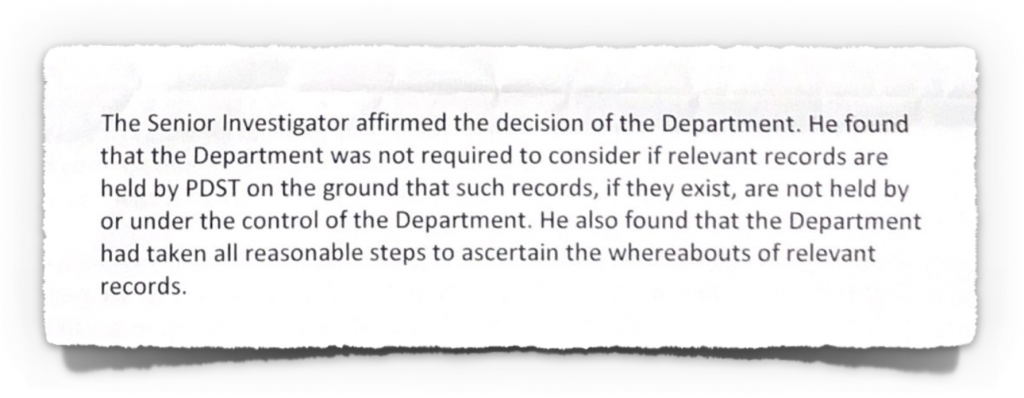
Upon receipt of this decision, I immediately submitted exactly the same FoI request to the DWEC, and that document is also available at the bottom of this page.
October 2019
As part of my submission of exactly the same FoI request to the DWEC, I provided that organisation with the previous decision of the OIC. Full copies of the FoI request and the responses from the DWEC are available at the bottom of this page. An extract from the final internal review decision, which was dated 10th October 2019 and written the Chairperson of the DWEC Management Committee, is illustrated below.
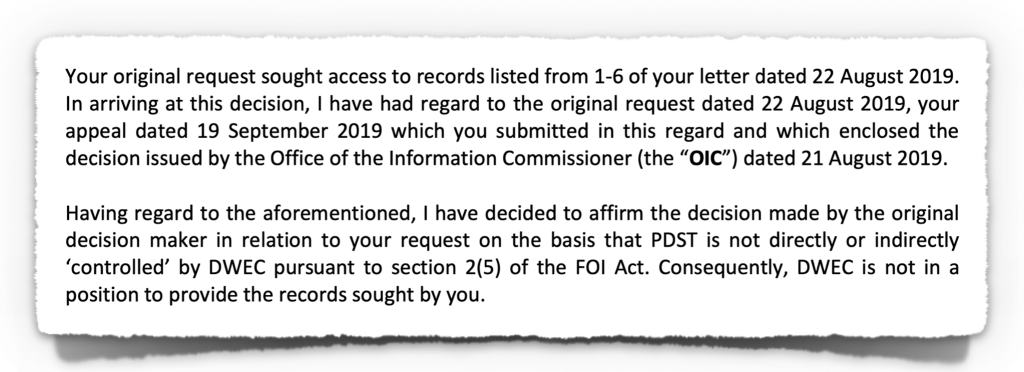
Since the DWEC was also refusing to procure the communications that the National Director of the PDST had already accepted were received, I had to seek another review by the OIC. This review was to take a further 9 months.
July 2020
The OIC decision with respect to their review of how the DWEC handled my FoI request, was published on 10th July 2020. A full copy of that decision is available at the bottom of this page. The conclusion was that “the applicant will have to submit a fresh application to the Department”. That is, the OIC accepted that whereas they had previously affirmed the DoE position that the Department is not responsible for the PDST, they had now decided that this position was incorrect. The explanation provided in the extract below, appears to suggest that the error was due to the DoE being less than forthright with the OIC during the previous review. The bold type used by the OIC seems to blame the information that was provided to them by the Department for misleading the OIC, rather than blaming an OIC failure to ascertain the views of the DWEC during their previous review.
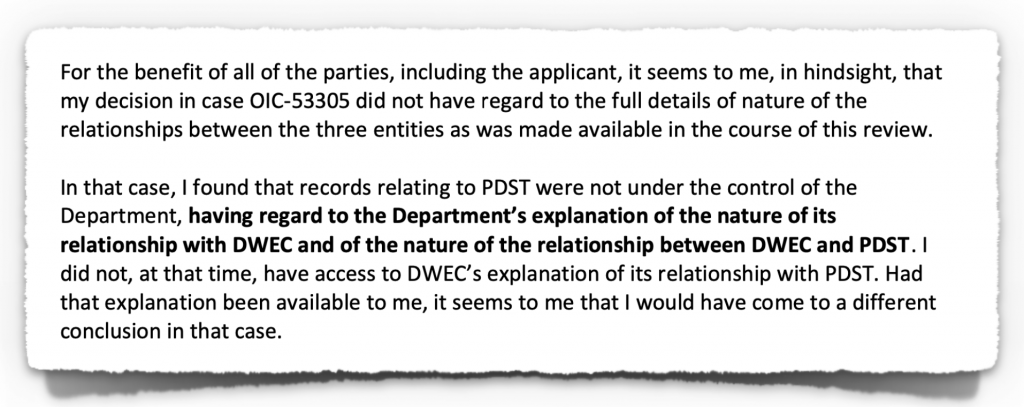
On the same day that that this OIC decision was published, I submitted an identical FoI request to the DoE for a second time. This was more than 16 months after I had previously submitted exactly the same FoI request to exactly the same public body. The consequences that applied to the DoE for causing this 16 month delay, were precisely zero. The consequences for me were over €100 in review fees, for which no refund was possible. Given that all of the consequences for delinquent behaviour on the part of public bodies are borne by FoI applicants, it is perhaps not surprising that such behaviour by public bodies persists.
On 4th September 2020, the DoE provided 2 emails to me between the PDST and representatives of the Roman Catholic Church. A full copy of this correspondence is available at the bottom of this page. One of those emails from the Diocese of Kerry to the National Director of the PDST, is already illustrated at the top of this page. The second email was from the Le Chéile Schools Trust, and that is illustrated below. The Le Chéile Schools Trust is a Roman Catholic organisation that represents fifteen different Roman Catholic religious congregations that are active within the education sector.

Importantly, these emails were provided by the DoE “outside of the FoI Act”, as their correspondence stated. That is, the DoE were allowing me to have just these 2 emails, but they were not agreeing to conduct a search for all of the PDST records that I sought. Specifically, they were still claiming that they were not in control of the PDST for the purposes of the FoI Act. Consequently, I had to work through another €30 review process at the DoE. When that failed, I applied for another €50 review by the OIC on 30th September 2020.
November 2020
Whereas I had been ready for another OIC review process to take more than 6 months, in fact I received an email from the OIC on 20th November 2020. A full copy of this email thread is provided at the bottom of this page. The extract from the start of the email thread that is illustrated below, began with the good news that the DoE had accepted their responsibility for FoI requests relating to PDST records.
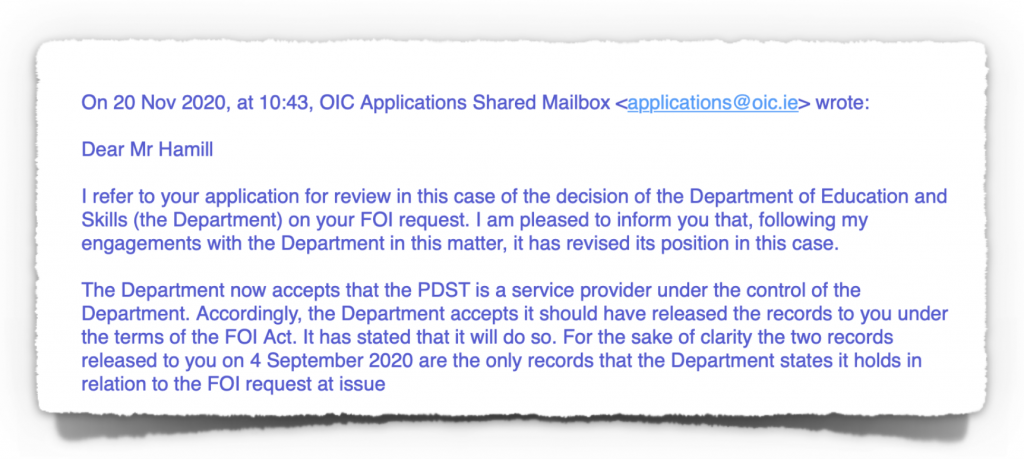
While this was a positive development, it was less encouraging to read the DoE position that the two emails already provided were the only documents held by the PDST or the DoE, which were responsive to my FoI request. In time, this DoE statement would also prove to be false. While even contemporaneously this statement did not seem at all credible, the OIC nevertheless asked if I was “satisfied to settle the case on this basis”, so that they could “close the case”.
I was not satisfied to close the case on this basis. I had asked on 1st January 2018 for the PDST records to be searched for these documents. Under the terms of the FoI Act, I was entitled to have this search conducted thoroughly and promptly. By this stage I had been waiting practically 3 years for the search to be conducted, and I had spent more than €300 in review fees. It was amazing to me that the OIC didn’t seem at all interested in whether the search for records was actually carried out or not. An extract from my response to the OIC email is illustrated below.
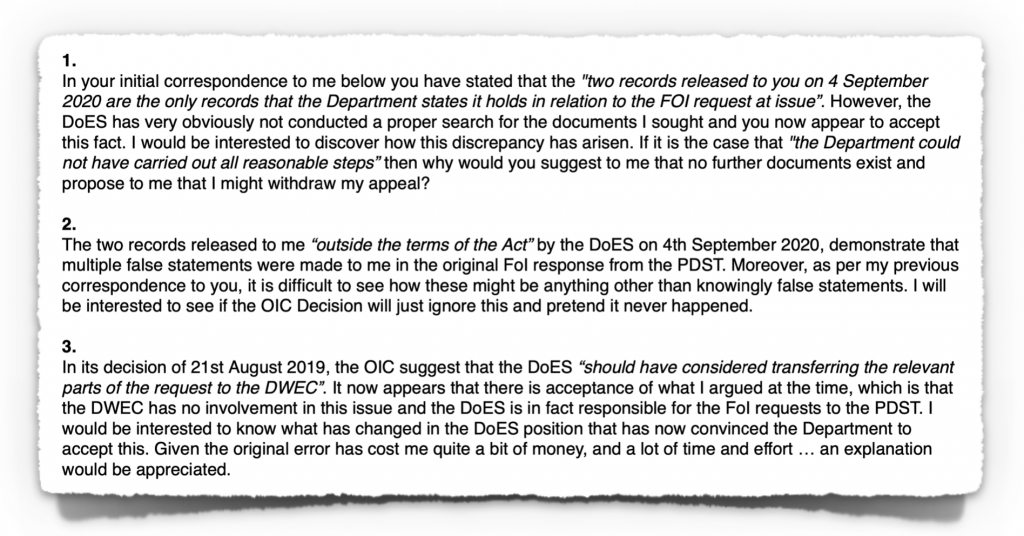
I asked the OIC not to close the case and to proceed with their review so that they would issue a final decision. Moreover, I explicitly asked that within this decision they would comment on the false statements that had been made in response to this FoI request, and also describe the specific inadequacies in the information given to them by the DoE that had caused so much avoidable delay and expense. The OIC did proceed to publish a final decision, but it did not comment on either of those two issues.
February 2021
The final decision after the OIC review was published on 26th February 2021, and it annulled the decision of the DoE. A full copy of that document is available at the bottom of this page, and a pertinent extract is illustrated below.
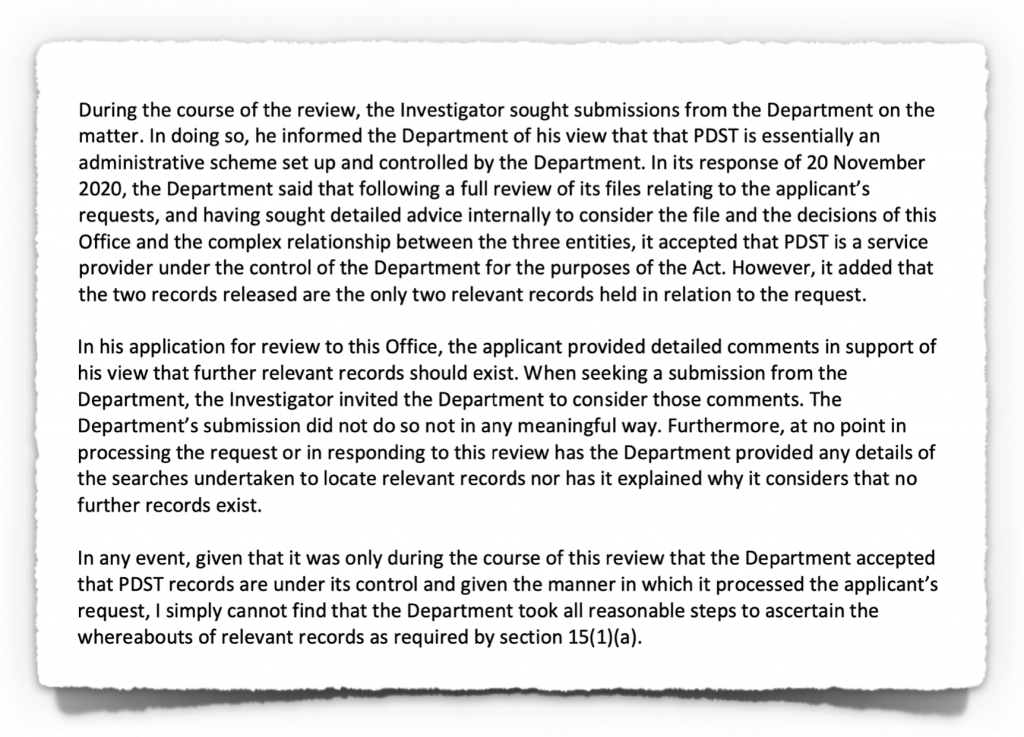
The OIC decision repeats the false DoE statement that the 2 emails already released were the only relevant records held. However, it also concludes that the DoE had not carried out an adequate search for documents and so it directed the Department to “consider the request afresh”. This fresh consideration of my FoI request was to begin more than 3 years after I had first submitted it. However, since the decision did not comment at all on any of the false statements that had been made throughout this period, I wrote to the OIC separately on this issue. All of that correspondence is available at the bottom of this page and an extract from the OIC response of 1st March 2021, is illustrated below.
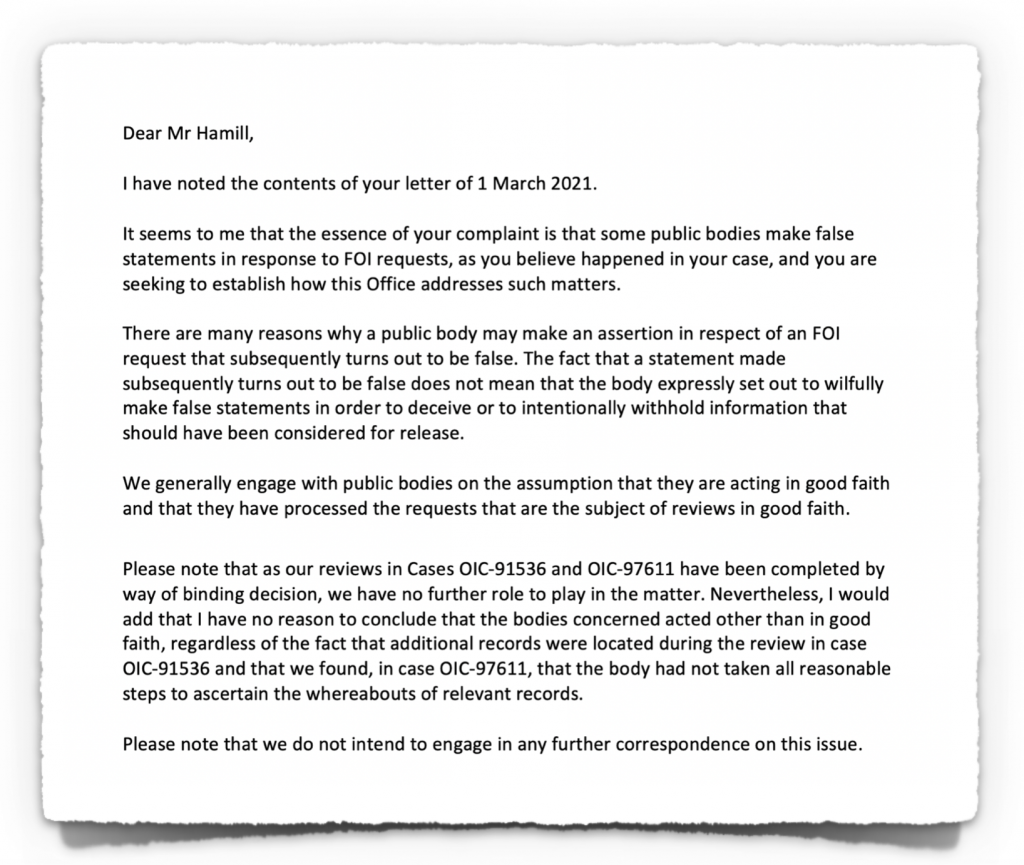
In summary, the OIC policy is to assume that public bodies are telling them the truth, and when false statements are made they then assume that these are simply good-faith errors. Specifically, in relation to those false statements made within my FoI request in particular, the OIC view was that the PDST and DoE were honestly trying to answer my request accurately, and to be as forthcoming as possible. They stated that in relation to all of the false statements described above, that they “have no reason to conclude that the bodies concerned acted other than in good faith”. This implies that:
- The National Director of the PDST who said “there has been no … communication between PDST and the Catholic Church”, simply forgot about all of the emails that they had personally exchanged with the Roman Catholic Church, and were also somehow unable to find those emails after conducting diligent searches.
- The National Director of the PDST who said “there have been no jointly arranged in-service days” with the Roman Catholic Church, simply forgot about all of the joint in-service days that they personally had arranged with the Roman Catholic Church, and were also somehow unable to find the relevant documents after conducting comprehensive searches.
- When the DoE said that, “there are no records held on Department files” about RE in-service days jointly arranged with the Roman Catholic Church, they simply forgot that the PDST provided annual reports to the DoE, and their detailed searches of Department records also failed to find their lists of exactly such joint in-service days.
- When the DoE said that, “the two records released … are the only records the Department holds” in relation to my FoI request, they simply forgot that the PDST provided annual reports to the DoE, which contain details of many PDST joint in-service days with the Roman Catholic Church. They also failed to find these electronic annual reports after conducting extensive online searches of their files.
It is conceivable that the OIC is correct on this point. Maybe the relevant people who work on CPD within both the PDST and the DoE, struggle to remember anything about RE in-service days, and also struggle to conduct effective electronic searches of their own records. Perhaps it is best to give them the benefit of the doubt in this regard, although the same people would shortly come to rely on their crystal clear memory of personally arranging all of these joint in-service days with the Roman Catholic Church.
April 2021
The DoE provided a formal response to my FoI request on 21st April 2021. A full copy of their correspondence is available at the bottom of this page, including the schedule of records. This was the first occasion on which the Department revealed that the PDST sends them detailed annual reports. Aside from that though, the response merely included the same two emails that were provided previously, which are already illustrated above. I sought an internal review, based on the fact that the annual report described 6 joint events with the Roman Catholic Church, whereas emails were only provided in relation to 2 of those in-service days. A full copy of that request for internal review is available at the bottom of this page.
The results of the internal review were provided by the DoE on 13th May 2021. A full copy of their correspondence is available at the bottom of this page, including the revised schedule of records. This was the first time that the DoE described the search terms that they had used when looking for electronic records. Somehow, as part of this internal review by a Principal Officer, the PDST had now managed to find an additional 4 emails that they were unable to find before. This is described in the extract from the internal review illustrated below.

The 4 additional records provided after the internal review are available in full at the bottom of this page. It is very difficult to understand how these additional emails were not provided with the initial FoI response. After all, the Department previously told the OIC that, “following a full review of its files relating to the applicant’s request, and having sought detailed advice internally … the two records released … are the only records the Department holds”. Moreover, it should not go unnoticed that some of the emails that were mysteriously missed by the first search, included those that were the most embarrassing to the PDST.
For example, an extract from one of the emails that for some unknown reason the PDST could not initially find as part of the “full review of their files”, is illustrated below. In this email, the person from the Roman Catholic Church requesting a joint in-service day, explicitly describes their role as involving “Faith Development”. The PDST did not respond to this Roman Catholic Church representative by explaining that public resources would not be used to evangelise other people’s children into Catholicism. Instead, the PDST provided taxpayer supports for these “Faith Development” intentions.
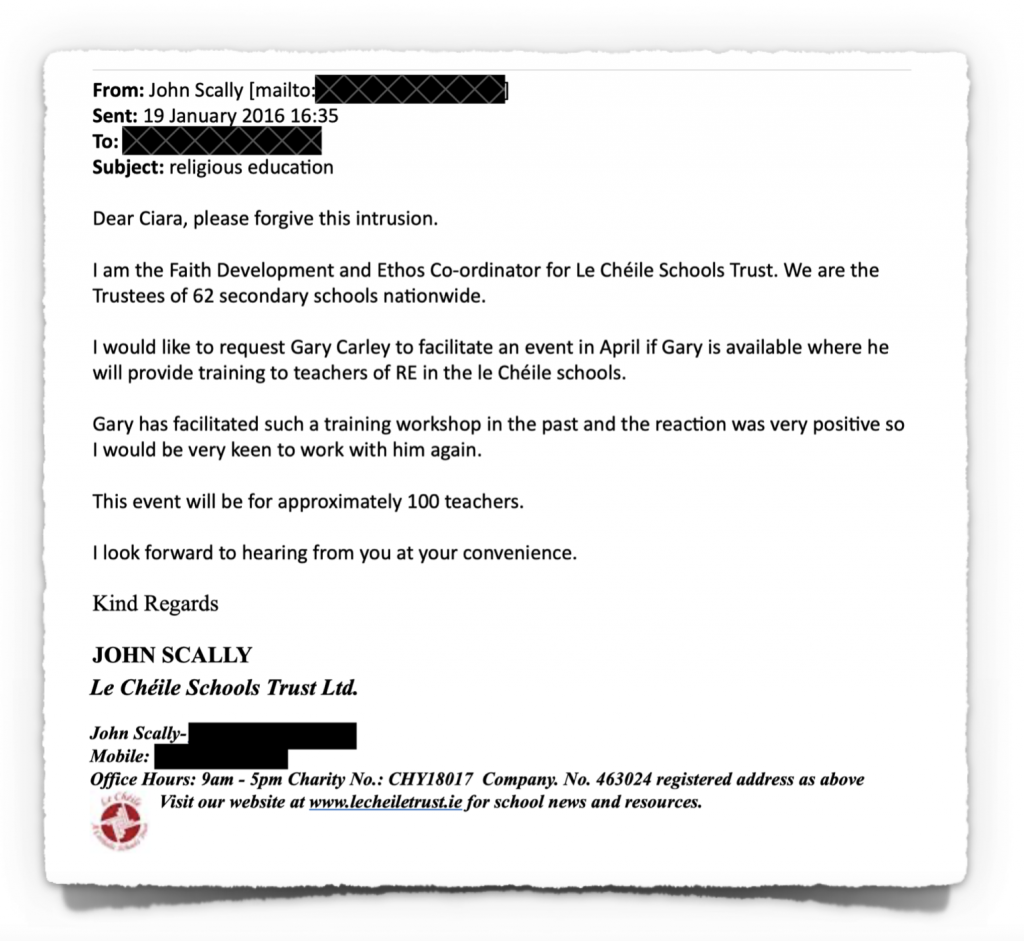
However, my main concern was not that such a detailed and full search somehow missed the most embarrassing emails, but rather that the 4 additional records all related to the same events for which documents had already been provided. That is, it remained the case that the annual reports described 6 PDST joint in-service days with the Roman Catholic Church, whereas records had only been provided to me in relation to 2 of those events. Moreover, the explanation offered by the PDST for why no records were provided with respect to the other 4 events, just did not seem credible. This explanation is included in the extract below.
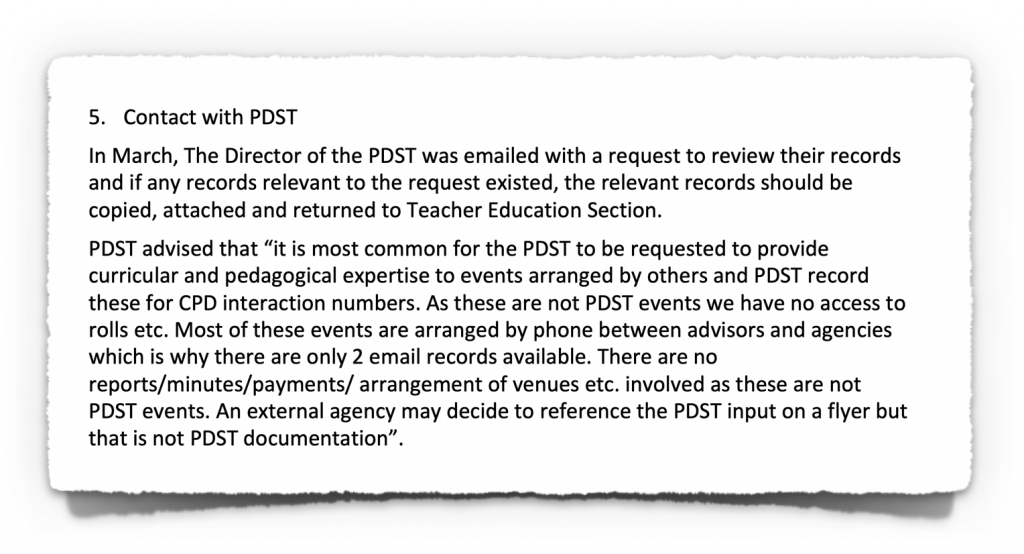
Even in stating that their travel around the country to deliver training courses was all arranged by phone, with nobody ever putting an address or an agenda or any of the other arrangements in an email, the PDST were still claiming that there were “only 2 email records available”. We now know that this was false. So the sequence of formal responses to my FoI request up to this point were:
- we have had no communication with the Roman Catholic Church (false)
- we didn’t arrange any joint events with the Roman Catholic Church (false)
- we have no records that list joint in-service days with the Roman Catholic Church (false)
- we only have a record of two emails with the Roman Catholic Church (false)
- of course we can recall exactly how all 6 of our events with the Catholic Church in that year were arranged, with only a couple being arranged by email and all the others definitely being arranged exclusively over the phone
The idea that everything was arranged by phone in relation to the 4 remaining mystery events, in fact raised even more questions. Here is one such question that I included in my correspondence to the OIC on 13th May 2021, when I submitted yet another request for yet another OIC review.
“If there were no records created in relation to the other joint events between the PDST and the Catholic Church, because all arrangements were made entirely by phone only, how did the PDST manage to list all of those events in their annual report, including details of how many attendees were present at each event?”
Question from my May 2021 Request for an OIC Review
The response to my FoI request stated that when the Roman Catholic Church wanted the PDST to help deliver a training course, they only ever discussed the logistics and the desired joint agenda over the phone, and never put any of that information in writing. PDST representatives always managed to turn up in the correct town; at the correct address; at the correct time; on the correct date; and successfully deliver their material within the joint training course agenda; without the organisers of these joint in-service days ever providing any of that information, other than over the phone. Subsequently then, when writing their annual reports the PDST would be able to recall an accurate description of the content delivered during all such joint training events, without ever having been given a written description of the requested training agenda. This seemed like an incredibly impressive feat of memory, especially given that the same people could not remember anything at all about any of these events when first asked. Despite my explicit request that the OIC should address this issue in their decision, they did not.
October 2021
I received an interim letter from the OIC on 7th October 2021, which was issued during the course of their review of the latest DoE position. A full copy of that correspondence is available at the bottom of this page, along with a full copy of my response. In summary, I had asked that the search terms for records responsive to my FoI request should include the names of the Roman Catholic Church representatives who requested the joint in-service days. That is, the search terms should not be limited just to the generic words like ‘Catholic’ and ‘Church’ that had been used by the DoE and the PDST.

The OIC continued to treat as unimpeachable, whatever the latest DoE description was of “the way in which PDST would interact with churches”. This was despite the fact that the DoE had already already provided a long list of false and mutually contradictory statements on the nature of these interactions. Whereas the OIC had previously offered apologetics for the PDST statement that they never interacted with the Roman Catholic Church at all, now the OIC was relying on the DoE claim that all the PDST arrangements with the Roman Catholic Church were exclusively conducted over the phone. Specifically, the reason given by the OIC for not insisting on the searches that I had requested, was that since the PDST typically interacted with churches only over the phone, there was no point searching for more records as no additional documents would be found.
January 2022
The final OIC decision after this review, was then issued on 31st January 2022. A full copy of that document is available at the bottom of this page and some pertinent extracts are illustrated below. Firstly, the OIC decision included a paragraph stating that they would not be considering the false statements made by the DoE to date, or considering my questions about how the annual reports managed to list details of each in-service day if all arrangements were made only over the phone.

It seemed pretty extraordinary to me when the OIC reported that it did “not have a role … in commenting on the content of correspondence issued to the applicant”. So where a long series of false statements were made to me in response to my FoI requests, the OIC did not have any role in making any comment at all on that. The OIC also reported that it did “not have a role in seeking the Department’s response to questions that the applicant asks”. So where I asked how the DoE claim to have no further records could be reconciled with documents than contradict this assertion, the OIC did not have any role in considering that issue either. This seems to quite substantially diminish the utility of OIC reviews in general. Specifically, even though all of the DoE false statements up to this date had cost me several hundred euro in OIC review fees, the OIC were now telling me that they would continue to unquestioningly accept the veracity of everything the DoE stated, even if that was inconsistent with the documentary record, and inconsistent with previous DoE statements.
The OIC decision goes on to summarise the submissions made by both myself and the DoE during the course of the review, and then the decision proceeds to provide the OIC analysis of how the outcome should be determined. The extract illustrated below includes the premise for their analysis.
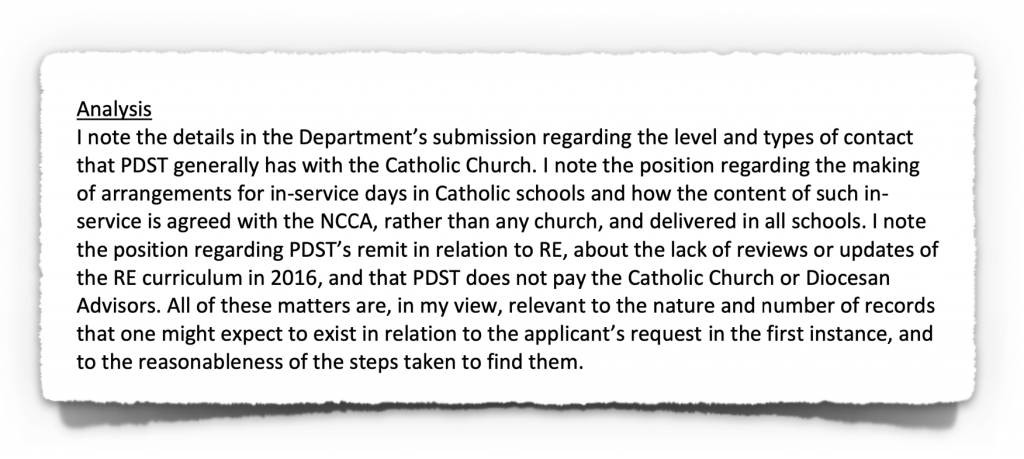
This is consistent with the stated OIC policy of simply accepting the truth of everything they are told by a public body, even though the very purpose of the review may be that the veracity of the information being provided by the public body has been brought into question. For example, the “Senior Investigator” who conducted the OIC review states that they “note the details in the Department’s submission regarding the level and types of contact that the PDST generally has with the Catholic Church”. This is a bizarre comment, given that there would not be any OIC review required if it wasn’t for the various mutually contradictory PDST descriptions of their interactions with the Roman Catholic Church.
Specifically, the “Senior Investigator” doesn’t say which of the contradictory DoE positions they are noting. Are they noting the original position that, “There has been no such correspondence or communication between PDST and representatives of the Catholic Church”? Are they noting the DoE position that, “the two records released … are the only records the Department holds”? Are they noting one of the various other contradictory DoE positions on the same issue? An investigation implies an attempt to resolve the issue that is in dispute between the parties, for example by insisting on a comprehensive search for records. The reason why this OIC review was required in the first instance, was that many contradictory answers had been given about “the level and types of contact that the PDST generally has with the Catholic Church”. Simply noting the latest submission from one party and assuming that this new story is gospel, while refusing to consider any questions raised by the other party, does not seem to constitute an investigation.
The OIC decision concluded that it was unreasonable to expect the PDST to search for emails using the names of the people that they arranged the joint events with. The searches using the generic terms listed by the DoE, were deemed by the OIC to be a sufficient response to the language in my FoI request. As such, I immediately submitted a new FoI request for communications between the PDST and email accounts with Roman Catholic Diocese domain names. A full copy of that FoI request is available at the bottom of this page.
March 2022
After working through the usual €30 review process with the DoE, they continued to refuse my request without conducting any search for emails with Roman Catholic Diocese domain names. That is, since they claimed they could recall that the remaining 4 mystery joint in-service days were all arranged by phone only, they also claimed to therefore know in advance that the search I requested would not uncover any new records. A full copy of this decision is available at the bottom of this page, and the relevant extract is illustrated below.

The only way to know that better search terms would not reveal any new documents, is to accept in advance that all 4 of the remaining mystery joint in-service days were arranged entirely by phone, so that no further emails on this topic were exchanged. I sought another OIC review in relation to this decision and on 19th May 2022, and I received some further correspondence from the OIC in the context of that review. A full copy of the OIC letter is available at the bottom of this page, and an extract is illustrated below.

The Department position was that they knew in advance that the improved search terms I requested would not turn up any new records, because the PDST can recall that each of the 4 mystery in-service days were arranged entirely by phone. The OIC wrote that the “Department said that the searches already carried out for the purposes of your previous request would have identified the records”, and so as far as the OIC was concerned, that was the end of the matter. The problem with accepting this DoE position at face value though, is that it directly contradicts the rationale used to excuse all of the previous false statements.
Previously, when the PDST had provided a series of demonstrably false statements in their FoI responses, the OIC rushed to explain that the PDST could easily just have forgotten about some interactions with the Roman Catholic Church, or that they were merely poor at conducting electronic searches. Now when the PDST is asked to perform a more specific electronic search with better search terms, the OIC rushes to explain that there is no need to do so because the PDST can remember with perfect fidelity that all of the relevant events were arranged only by phone (and also that the previous electronic searches were so perfectly constructed that they would have already found any relevant records).
Which is it? If those within the PDST can remember very clearly how 2 of their 6 joint events with the Roman Catholic Church were arranged by email, while the other 4 were all arranged only by phone, then why did their initial formal FoI response insist that there had never been any communications or joint in-service days with the Roman Catholic Church? In contrast, if their denial of any communication with the Roman Catholic Church was due to good-faith forgetfulness, then how could they now be certain in advance that using some better search terms to look for records of the 4 mystery in-service days, would turn up no new documents at all? I raised exactly this question in my response to the OIC, and a full copy of that correspondence is available at the bottom of this page.
July 2022
Unfortunately, the OIC was not able to see any contradiction in what I had described. In their subsequent correspondence of 5th July 2022, they made clear that they would not consider any discrepancy within their position. A full copy of that correspondence is available at the bottom of this page, and the relevant extract is illustrated below.
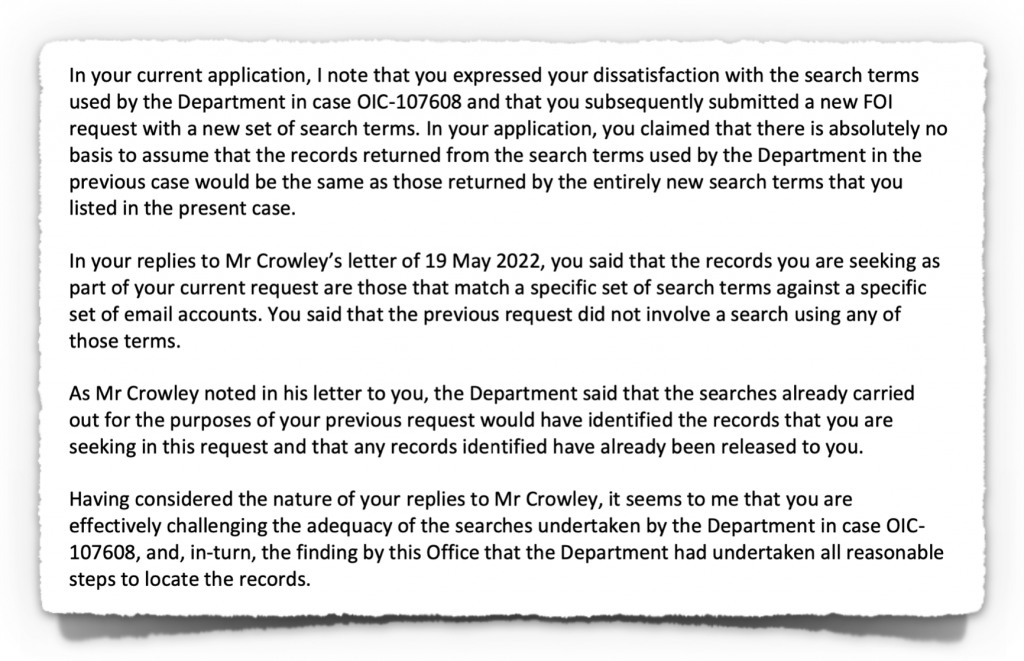
Literally for years, I was being admonished by the OIC that the PDST were simply forgetful or imprecise at electronic searches, such that their long series of false statements were the result of good-faith human error. Now, well over 4 years later, I was being chastised by the same OIC that the same PDST didn’t need to carry out the searches I had requested, because they had such high-fidelity memories that they could clearly recall arranging all the relevant events by phone only, and their previous electronic searches were so precisely calibrated that no records could have escaped them.
The following were the relevant false statements made to me since I initially submitted this FoI request:
- The National Director of the PDST said, “There has been no such correspondence or communication between PDST and representatives of the Catholic Church”. In fact, the same National Director had been personally involved in a lot of the specified communications.
- The National Director of the PDST said, “There have been no jointly arranged in-service days” with the Roman Catholic Church. In fact, the same National Director had personally been involved in jointly arranging many such in-service days with the Roman Catholic Church, using public funds.
- The DoE said that after “a search of electronic records” they could confirm that “there are no records held on Department files” about joint PDST and Roman Catholic Church in-service days. In fact, the DoE had electronically searchable annual reports from the PDST, which listed many such in-service days.
- The DoE said that with respect to in-service days jointly arranged between the PDST and the Roman Catholic Church, “most of these events were arranged by phone, which is why there are only two records“. In fact, it was subsequently revealed that a further 4 relevant records existed, several of which were among the most embarrassing to the DoE.
The result of this long series of false statements has been 55 months of delay and more than €400 in review fees. After I had waited more than four and half years, while paying hundreds of euro for the privilege, the OIC told me that there is no need to even perform the searches I requested using Roman Catholic Diocese domain names. This is because the DoE and the PDST have assured them that the improved search terms will not find any new records. It seems that the OIC patience for false statements by public bodies is functionally infinite, and nothing will deter them from credulously accepting everything they are told as if it is written in stone.
In Ireland, Freedom of Information is neither free nor informative, because public bodies often provide untruthful statements in response to FoI requests, and the OIC often doesn’t care.
- 2018-01-01 FoI Request to PDST
- 2018-01-30 FoI Response from PDST
- 2018-02-02 Request for FoI Review by PDST
- 2018-02-05 Email from PDST National Director
- 2018-02-09 FoI Correspondence from PDST
- 2018-02-21 Request for FoI Review by OIC
- 2018-02-28 Submission to OIC Review
- 2018-08-21 Decision following OIC Review
- 2018-12-07 Additional Submission to OIC Review
- 2018-12-14 FoI Request to DoE
- 2019-01-16 FoI Response from DoE
- 2019-01-31 FoI Correspondence from DoE
- 2019-02-07 Request for FoI Review by OIC
- 2019-08-21 Decision following OIC Review
- 2019-08-22 FoI Request to DWEC
- 2019-09-19 FoI Response from DWEC
- 2019-10-10 FoI Correspondence from DWEC
- 2020-07-10 Result of OIC Review
- 2020-09-04 FoI Response from DoE
- 2020-11-20 Email thread with OIC
- 2021-01-01 Letter to OIC
- 2021-01-07 Letter from OIC
- 2021-02-26 Decision following OIC Review
- 2021-03-01 Letter to OIC
- 2021-04-21 Letter from OIC
- 2021-04-21 Letter to OIC
- 2021-04-21 FoI Response from DoE
- 2021-04-21 FoI Schedule from DoE
- 2021-04-22 Request for Internal DoE Review
- 2021-05-13 FoI Correspondence from DoE
- 2021-05-13 FoI Schedule from DoE
- 2021-05-13 Additional Records from DoE
2 responses to “FoI Is Neither Free Nor Informative”
[…] this 5-year period. Full copies of all the original correspondence are available at the bottom of this article, which includes a lot more detail. The new evidence is available in full at the bottom of this […]
[…] a long list of mutually contradictory excuses for why they won’t provide these records. The full details of all the associated appeal documents at the Office of the Information Commissioner (OIC) describe a sequence of PDST positions that may […]